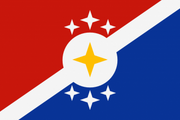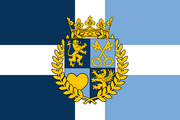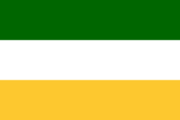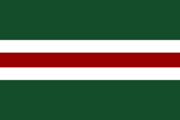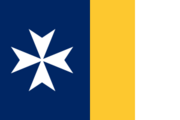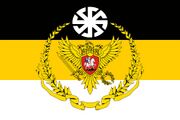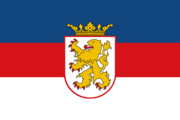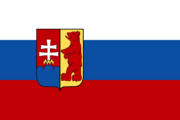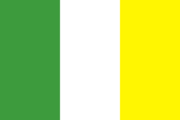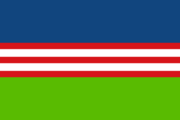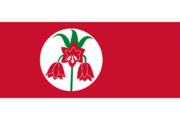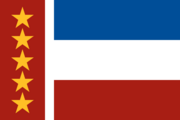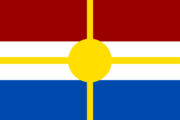Kento-Polyash languages
| Kento-Polyash | |
|---|---|
| Thuad Slavic | |
| Ethnicity | Thuadian Slavs |
| Geographic distribution | Southern Thuadia So called "Slavic Belt" |
| Linguistic classification | Thuado-Thrismaran
|
Early form | |
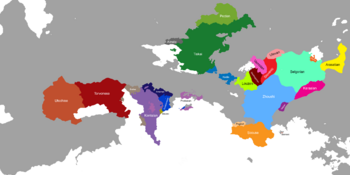 | |
Kento-Polyash languages are a Slavic language subgroup present in southern Thuadia, mostly in the areas of the Sekidean Union.

History
Kento-Polyash languages diverged from Germanic languages in the area of present-day southern Nerany in about 1st century BCE and slowly migrated to the equator in a span of 400 years, populating area from western Torvon across Kentalis, Krenya, Khemmi, Gadorien, Zhousheng, southern Bakyern, Monte Blanco and western Gabrielland. In about 6th century AD, Germanic tribes, mainly southern Bak tribes and Gadorieni tribes started pushing on Slavic settlements. Over time, most of the Slavic population, called the "Kartovians" in Gadorien was assimiliated into Gadori culture and language, only keeping old traditions in the remote area of Louzeni. Similar thing happened in Southern Bakyern, although there is still a area with a Ulevan majority. In the end of the first millenium, most of the areas formerly settled by Slavs in Torvon and in Gadorien has been assimilated into their new cultures (In the remote Duchy of Louzeni in Gadorien, Louzenish was created as a slavic language with strong germanic influences). Similar thing happened in Ereska, when new Khemmic settlers formed a lingustic corridor, splitting Kentalis from Ereska. Currently, Kento-Polyash languages are a majority in Mustelaria and Kentalis and a plurality in Krenya, while retaining minority status in Gabrielland and Gadorien.
Writing and alphabets
Former writing style of all Kento-Polyash languages was Protopolyash miniscule, which was retained until 18. century in most of the linguistic areas, but was eventually abandoned or edited in most of the countries (it is currently still used by Belgorian, Gorgavian and Karaalanish). Main problems with the script are lack of phonemes used in many languages, which makes one character represent multiple sounds and problems of drawing the letter, as some of them are complicated to be easily recognized from each other. Kentalis has reformed the script into a Kentalan alphabet, while Zhoushi/Bogmian language, Louzenish, Ereskaneese, Slovanic and Gabrielt Slavic adopted their versions of Latin alphabets.
Currently, a new project in Mustelaria is underway, trying to create an artificial mutually inteligible language named "Neo-Mustelarian" for easier communication among 4 slavic groups living in Mustelaria, this language has projected 30 phonemes and is written in Latin alphabet with diacritics:
| A a | B b | C c | Č č | D d | E e | F f | G g | Ǧ ǧ |
| H h | Ȟ ȟ | I i | J j | K k | L l | M m | N n | O o |
| P p | Q q | R r | S s | Š š | Ŝ ŝ | T t | U u | V v |
| W w | X x | Y y | Z z | Ž ž |
Language hybrids
Those languages are know for their hybridisation with neighboring language groups. Zhoushi language is a assimiliation of a Prei-Phnom language called Zhengian into a Slavic language called Bogmian. Similar phenomena can be seen in Louzenish, which is integration of Bogmian language with Gadorieni Germanic language, Gorgavian, which is a integration of Belgorian language with Gorgavinian language, which was a Language isolate[1].
Example of chosen Kento-Polyash languages (Lord's prayer)
| Common language | Zhoushi language | Belgorian language | Slovanic language | Karaalanish language | Kental language | Ereskaneese language | Velnotian language | Pecian language |
|---|---|---|---|---|---|---|---|---|
| Our Father in heaven, | Oþчe naш, kitory jesꞇєш na ƞieby, | ⲟⲧⲕⲓ ⲛⲁϣⲓ, ⲧⲓϣ ⲓⲥⲉϣ ⲛⲁ ⲛⲓⲉⲃϣⲓⲭⲁⲭ, | Otče náš, ktorý si na nebesiach, | ⲟⲧϣⲉ ⲛⲁϣ, ⲕⲟⲏⲧⲟ ⲥⲓ ⲛⲁ ⲛⲉⲃⲉⲥⲓⲙⲁ, | Оче наш, који си на небесима, | Otec naš na Nebesah, | Otče náš, jenž jsi na nebesích, | Отче наш небесный, |
| hallowed be your name. | mino Tiƿe buđ posviƌeno, | ⲡⲟⲥⲫⲁⲧⲓⲓ ⲥⲁ ⲙⲉⲛⲟ ⲧⲯⲟⲓⲟ, | posväť sa meno Tvoje, | ⲇⲁ ⲥⲉ ⲥvⲉⲧⲓ ⲓⲙⲉ ⲧvⲟⲓⲉ, | да се свети име Твоје, | pustʹ proslavitsja Tvoë imja, | posvěť se jméno Tvé, | да святится имя твое. |
| Your kingdom come. | Tiƿoje guo pꝛiȝađ, | ⲡⲣⲓⲓⲭⲟⲇⲓⲓ ⲕⲣⲁⲗⲫⲥⲧⲯⲟ ⲧⲯⲟⲓⲟ, | príď kráľovstvo Tvoje, | ⲇⲁ ⲇⲟⲏⲇⲉ ϭⲁⲣⲥⲧvⲟ ⲧvⲟⲓⲉ, | да дође царство Твоје, | pustʹ pridët Tvoë carstvo, | příjď králoství Tvé, | Ваше королевство пришло. |
| Your will be done, | biduч Tiƿuj janг, | ⲃⲓⲓ ⲯⲩⲟⲗⲁ ⲧⲯⲟⲓⲁ, | buď vôľa Tvoja, | ⲇⲁ ⲃⲩⲇⲉ vⲟⲗⲏⲁ ⲧvⲟⲏⲁ, | да буде воља твоја, | pustʹ volja Tvoja, | děj se vůle Tvá, | Ваша воля будет выполнена, |
| on earth as it is in heaven. | jak fu ƞeby, tak aj na zөmi. | ⲓⲁⲕ ⲯ ⲛⲓⲉⲃⲓ, ⲧⲁⲕ ⲁⲓ ⲛⲁ ⲍⲉⲙⲛⲓ. | ako v Nebi, tak i na Zemi. | ⲕⲁⲕⲧⲟ ⲛⲁ ⲛⲉⲃⲩ, ⲧⲁⲕⲁ ⲓ ⲛⲁ ⲍⲉⲙⲗʹⲓ. | и на земљи као на небу. | kak na Nebe i na Zemle. | jak v Nebi, tak i na Zemi | на земле, как на небе. |
| Give us this day our daily bread | Ȝilab maш tudejшij divaj mam dƞes | ⲭⲗⲓⲉⲃⲓⲕ ⲛⲁϣ ⲯⲍⲇⲉⲓϣⲁⲓ ⲇⲁⲓ ⲛⲁⲙ ⲇⲛⲓⲉⲥ | Chlieb náš daj nám dnes | ϩⲗⲓⲁⲃ ⲛⲁϣ ⲛⲁⲥⲩϣⲧϣⲛⲓⲏ ⲇⲁⲏ ⲅⲟ ⲛⲁⲙ ⲇⲛⲉⲥ | Хљеб наш насушни дај нам данас | Daj nam segodnja nasuŝnyj naš hleb | Chléb náš dej nám dnes | Дай нам на сей день хлеб наш насущный |
| and forgive us our debts, | aj ƿypujuшꞇaj mam гriȝy maшije, | ⲓ ⲟⲇⲡⲩϣⲧⲓ ⲛⲁⲙ ⲛⲁϣⲓⲉ ⲯⲓⲛⲓⲉ, | a odpusť nám naše viny, | ⲡⲣⲟⲥⲧⲓ ⲛⲓ ⲇⲩⲗⲅⲟvⲉ ⲛⲁϣⲓ, | и опрости нам дугове наше, | i prosti nam naši dolgi, | a odpusť nám naše hříchy | и прости нам долги, |
| as we also have forgiven our debtors. | jak aj my ƿypujuшamy mašim huoqum. | ⲓⲁⲕ ⲓ ⲙⲓ ⲟⲇⲡⲩϣⲧⲓⲁⲙⲉ ⲛⲁϣⲓⲙ ⲯⲓⲛⲓⲕⲁⲙ. | ako i my odpúšťame svojim vinníkom. | ⲕⲁⲕⲧⲟ ⲓ ⲛⲓⲉ ⲡⲣⲟϣⲧϣⲁⲯⲁⲙⲉ ⲛⲁ ⲛⲁšⲓ ⲇⲗⲩⲍϣⲛⲓϭⲓ. | као што и ми опраштамо дужницима својим. | kak i my proŝaem teh, kto nam dolžen. | jako i my odpouštíme svým hříšníkům. | как и мы простили своих должников. |
| And do not bring us into temptation, | Aj ƞevydaj mas fu pakuшenji, | ⲓ ⲛⲓⲉⲍⲯⲓⲉⲇⲁⲓ ⲛⲁⲥ ⲯ ⲡⲟⲕⲩϣⲓⲉⲛⲓⲉ, | A neuveď nás do pokušenia, | ⲛⲉ ⲛⲓ vⲩvⲉⲍϣⲇⲁⲏ v ⲓⲍⲕⲩϣⲉⲛⲓⲉ, | И не уведи нас у искушење, | Ne podvergaj nas ispytaniju, | A neuveď nás v pokušení, | И не введи нас в искушение, |
| but rescue us from the evil one. | le zibafuj mas ƿy Jingu. | ⲁⲗⲓⲉ ⲭⲣⲁⲛⲓⲓ ⲛⲁⲥ ⲟⲇ ⲍⲗⲟⲅⲟ. | ale zbav nás Zlého. | ⲛⲟ ⲓⲍⲃⲁvⲓ ⲛⲁⲥ ⲟⲧ ⲗⲩⲕⲁvⲁⲅⲟ. | но избави нас од злога. | no zaŝiti nas ot Zlodeja. | ale zbav nás od Zlého. | но спаси нас от лукавого. |
Flags of the nationalities
- ↑ Note: see Bulgarian language to imagine how this integration might have looked like
